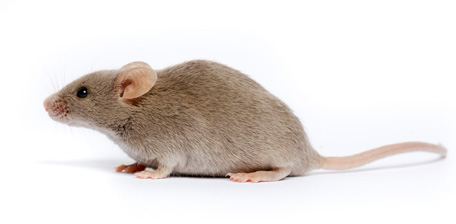JAX® Mice study: starvation diet does not always extend life
JAX Notes | July 1, 2009
If you're not overweight, eating less may not extend your life span. It may even be dangerous; so concludes a recent study by a team of University of Southern California and University of North Texas Health Science Center researchers (Sohalet al. 2009). Before the research team published their findings, many scientists believed that a slower metabolic rate, which results in less oxygen consumed and fewer free-radicals produced, increases longevity in mice (Wenjak 2009). To question this thinking, the recent study compared the metabolic rates and life spans among C57BL/6J (B6,000664) and DBA/2J (D2, 000671) mice that had either free access to food or were food-restricted throughout their lives.
It was known that while B6 mice normally double their weight during adult life and live longer when food-restricted, adult D2 mice stay lean and do not live longer when food restricted. The researchers confirmed this: free-feeding B6 and D2 mice ate similar amounts of food throughout the experiment and weighed about the same at four months. However, whereas free-feeding B6 mice gained 20% more weight from four months through the end of the experiment, free-feeding D2 mice gained no more weight. Young and old free-feeding D2 mice had significantly higher metabolic rates than same-age free-feeding B6 mice.
 Food restriction lowered the metabolic rates of both strains (regardless of age), suggesting that food restriction extends a mouse's life span not because it lowers metabolic rate but because it balances a mouse's energy intake and expenditure. In other words, the mouse lives longer because it no longer eats more than it can burn off.
Food restriction lowered the metabolic rates of both strains (regardless of age), suggesting that food restriction extends a mouse's life span not because it lowers metabolic rate but because it balances a mouse's energy intake and expenditure. In other words, the mouse lives longer because it no longer eats more than it can burn off.
"Our study questions the paradigm that caloric restriction is universally beneficial," says Dr. Rajindar Sohal, first author of the study. "Contrary to what is widely believed, caloric restriction does not extend the life span of all strains of mice." He comments further that people who aren't overweight and use extreme calorie restriction as an anti-aging strategy may be indulging in "a pointless, frustrating and even dangerous exercise. Your energy expenditure and your energy intake should be in balance. It's as simple as that. And how do you know that? By noticing if you are gaining or losing weight. The whole thing is very commonsensical." (Live Science 2009)
References
Wanjek C. 2009. Longevity from calorie restriction diet questioned. Live Science (www.livescience.com/health/090127-bad-calorie-restriction.html).
Science Daily. 2009. Eating less may not extend human life: caloric restriction may benefit only obese mice.Science Daily, Jan. 22.
Sohal RS, Ferguson M, Sohal BH, Forster MJ. 2009. Life span extension in mice by food restriction depends on an energy imbalance.J Nutr 139: 533-9.
